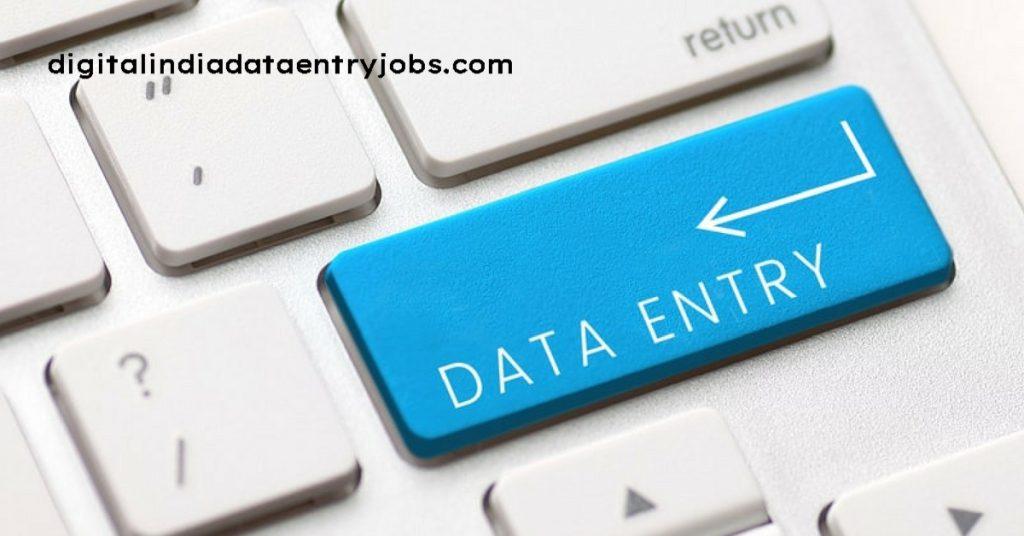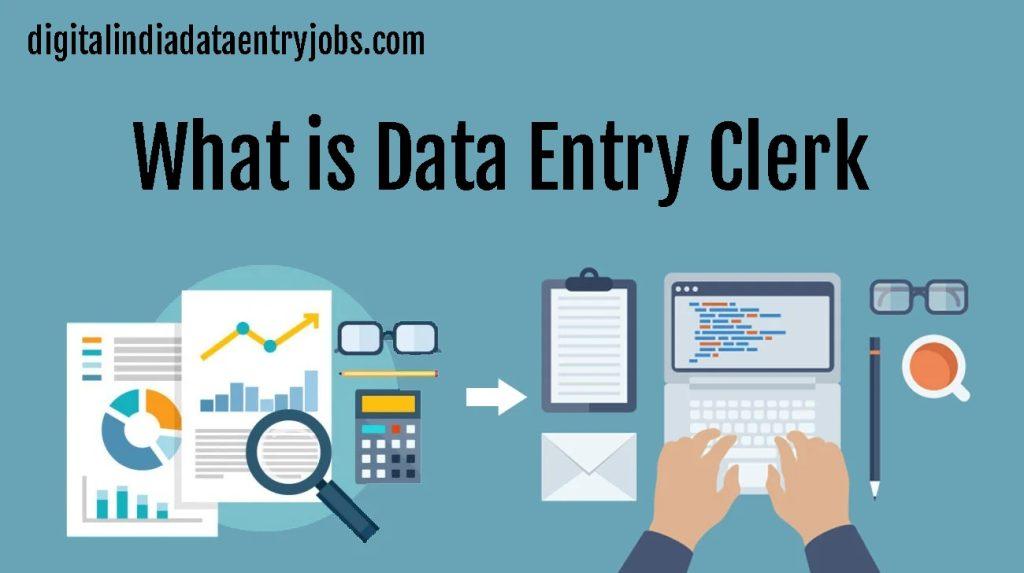What is a Data Entry Clerk:- How do you deal with the situation of occasionally being completely impoverished? The general public’s image of remote work is rapidly shifting due to new technologies as more businesses come to understand the benefits of outsourcing. Contrarily, employees are now so worried about maintaining a work-life balance that they consider factors other than compensation, location, and possibility for advancement when making a professional decision.
Within the framework of the so-called gig economy, data entry is a prime example of very popular online employment. Starting out usually doesn’t require any experience, and it may be done as a full-time remote career or as a side gig. This article includes the information you need to decide if working as a data entry clerk is the appropriate career move for you.
Contents
What Does a Data Entry Clerk Do?
Data entry clerks are essential to preserving an organization’s data management system’s precision, consistency, and effectiveness. They carefully enter, amend, and check different types of data—often from paper documents—into digital databases, making sure the information is safe and easily available. Their capacity to handle vast amounts of data and their attention to detail is essential for meeting the operational demands of companies in a variety of industries.

Also Read:- Data Entry Jobs from Home, Indnewsupdates, Digitizeindiagov, Onlinereferjobs
Key Responsibilities of a Data Entry Clerk
- Accurately adding new data and updating existing information in pertinent databases
- Checking the accuracy and completeness of the data, making any required corrections, and
- Obtaining requested data from electronic files or databases
- To guarantee data preservation, make regular backups.
- File organization and data collection for computer entry
- Scanning papers and printing files as required
- Maintaining the confidentiality of important consumer or company data
- Following security and data integrity guidelines
- Producing reports, keeping finished work in predetermined places, and carrying out backup procedures
- Finding relevant information by going through the data
- Ensuring that office equipment is used properly and fixing any issues
- Working together to improve data input procedures with the management, IT team, and other employees
Qualifications and Requirements
Learn how to use computers and keyboards, as well as other fundamental hardware and software, before taking on the role of a proficient remote data entry clerk. For data entry operators to be eligible for new positions in the industry, post-secondary education or college degrees are not always prerequisites. Therefore, while applying for a job, a General Educational Development (GED) or a basic high school diploma will most likely satisfy the requirements.
Getting certified is one of the easiest methods to work as a data entry operator. The qualifications you will receive from community colleges and vocational institutions add credibility to your resume and could ultimately place you ahead of the competition, even though this path is never required.
In conclusion, these are the abilities you need to develop to become a capable and highly effective data entry clerk in any organization;
- A high school diploma
- Excellent communication skills
- Good command of the English language
- Exceptional typing skills
Also Read:- Data Entry Jobs Remote, scholarships gov, Mobilenumbertrackeronline, Nebsit Council

Types of Data Entry Clerks
Many sectors depend heavily on data entry, which calls for the exact processing of vast amounts of information and painstaking attention to detail. Since today’s data-driven world involves a wide range of business needs, different sorts of data entry clerks specialise in different areas of data management. These experts, who make sure that data is accurately input, safely saved, and made available for analysis and decision-making, are frequently the unsung heroes of the information management industry. Every sort of data entry clerk is essential to the accuracy and effectiveness of data management in an organisation, and their specialisation can have a big impact on their career path.
Traditional Data Entry Clerk
The foundation of data input operations is traditional data entry clerks. They are in charge of entering data accurately and consistently by transcribing information from paper documents into digital formats. These clerks frequently deal with a range of data sets, such as inventory lists, financial records, and client information. Their capacity to handle large amounts of data fast and with meticulous attention to detail is essential. They are particularly prevalent in industries where precise record-keeping is crucial, such as healthcare, finance, and retail.
Medical Data Entry Specialist
Medical data entry specialists are experts in managing private patient data and medical documentation. They understand coding schemes, and medical jargon, and adhere to HIPAA and other healthcare laws. These experts include information about diagnosis codes, treatment histories, patient encounters, and billing. They play a critical role in guaranteeing smooth communication between patients, insurance companies, and healthcare practitioners as well as the integrity of medical records.
Legal Data Entry Clerk
Entering Legal Data Clerks are experts at organising and managing case data and legal documents. Court transcripts, depositions, contracts, and other legal documents, as well as their formatting, must be known to them. They also need to understand legal terminology. Since even small mistakes can have serious legal repercussions, accuracy is especially crucial in this sector. Law firms, court systems, and corporate legal departments typically hire these clerks because they are crucial to the accessibility and arrangement of legal material.
Database Data Entry Operator
Data Entry in Databases Operators have the necessary skills to enter and manage information using database software. They might be in charge of making new database entries, updating ones that already exist, and guaranteeing the accuracy of the data stored in the system. Because they frequently understand the fundamentals of database structure and queries, these operators can traverse and maintain complex databases with ease. In industries like marketing, logistics, and customer relationship management, which significantly depend on sizable databases, they are indispensable.
Online Data Entry Clerk
Data entry clerks who work online are skilled in entering data online. They might enter and update data via content management systems, web-based apps, or online forms. The ability to adjust to diverse interfaces and workflows, as well as knowledge of a variety of online platforms, are frequently necessary for this kind of data entry work. E-commerce, online marketing, and any company using web-based technologies for data management and collection need online data entry clerks.
Data Entry Quality Assurance Analyst
Data Entry Quality Control Specialist clerks known as analysts are responsible for preserving the quality and correctness of data entry. To find and fix mistakes in the data entry procedure, they conduct audits, spot checks, and methodical reviews. Their efforts guarantee the data’s dependability and safe application in analytical and tactical decision-making. In sectors like drugs, finance, and research where data accuracy is crucial, these analysts are indispensable.

How Much Can You Make with Data Entry?
An average data entry keyer in the United States makes about $15 per hour, according to data from the Bureau of Labour Statistics. For those just starting out in the field, its value quickly drops to just around $10 per hour. Experienced data entry workers, however, typically receive a guarantee of up to $22 per hour, irrespective of the businesses they join.
The real pay potential varies greatly depending on several factors, such as your position in the organisation, level of skill and experience, the complexity of the work at hand, and overall working speed.
Also Read:- What is Data Entry, Companycontactdetail, Uidaionlineaadharcard, Typingspeedtestonline
FAQs
Q.) What kind of cooperation do data entry clerks have with other teams in an organisation?
Ans. To guarantee correct and well-organized data for numerous departments, data entry clerks are essential. In addition to helping HR with employee records and finance with invoice entry, they collaborate closely with IT to preserve database integrity and supply essential customer data to the sales and marketing departments. Their careful data management makes interdepartmental operations run smoothly, promoting informed decision-making and efficient processes throughout the business.
Q.) What are some typical difficulties encountered by clerks who enter data?
Ans. Data entry clerks sometimes struggle with repetitive duties that might cause errors and weariness. They need to pay close attention to detail and concentrate very hard to maintain high accuracy levels even with repetitive input. They also have to worry about maintaining data confidentiality while fulfilling deadlines. Another major problem is keeping up with software upgrades and adjusting to different data management systems. For clerks to increase productivity and accuracy in their work, solid time management and ongoing skill improvement are necessities.
Conclusion
In the upcoming years, there will be more significant changes to the job environment as more businesses realize the importance of productivity. As more people choose remote work, this is the perfect moment for prospective data entry clerks to join the trend!
#Saras

